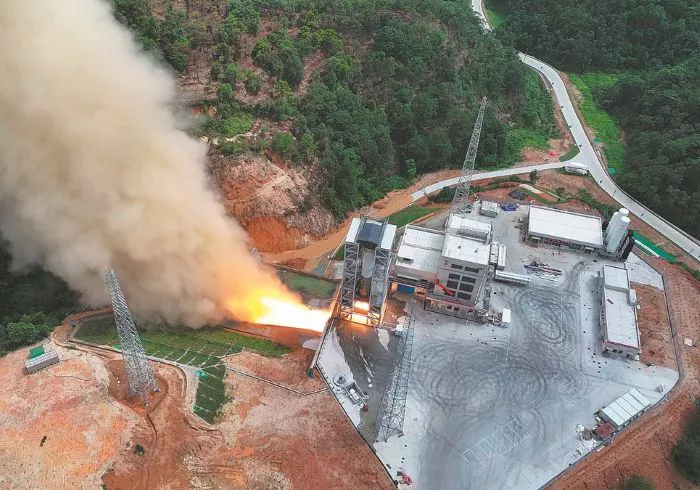China’s aerospace sector achieved another milestone as CAS Space, the commercial space arm of the Chinese Academy of Sciences, successfully completed critical engine testing for its new Kinetica 2 medium-lift rocket. The rigorous ground test conducted Wednesday at the company’s newly operational engine testing complex in Guangzhou’s mountainous outskirts yielded optimal results, confirming the propulsion system’s readiness for upcoming launch operations.
During the trial at the advanced liquid-fuel engine facility, multiple powerful engines demonstrated flawless component performance and system compatibility. The engines precisely met programmed duration requirements while generating design-specified thrust levels, earning unanimous approval from the engineering team. These successfully tested engines will power the 3.35-meter-diameter core booster’s first stage, providing the 766-ton maximum thrust needed to lift the 625-ton rocket from its launch pad.
The test also marked the inaugural operation of CAS Space’s cutting-edge Guangzhou testing complex, which boasts capacity for evaluating engines with up to 400 tons of thrust – including reusable engine variants. This state-of-the-art facility significantly enhances China’s domestic rocket development capabilities. Meanwhile, construction nears completion on supporting infrastructure at Jiuquan Satellite Launch Center, including a dedicated Kinetica 2 launch pad and technical preparation facilities that will streamline prelaunch operations.
Scheduled for its maiden flight in September, the 52-meter Kinetica 2 represents a major advancement in China’s commercial space capabilities. The three-stage rocket (comprising a core booster and two side boosters) will deliver payloads of up to 12 tons to low-Earth orbit or 8 tons to 500km sun-synchronous orbits. Its debut mission will carry special significance as it launches the Qingzhou (“Light Ship”) cargo vessel – a cost-effective resupply spacecraft developed by the Chinese Academy of Sciences’ microsatellite division to support the Tiangong space station.
This successful engine test underscores CAS Space’s rapid progress since establishing in 2018, with the Kinetica 2 positioned to become China’s most capable commercially-developed medium-lift vehicle. The achievement highlights the growing sophistication of China’s aerospace industry as it continues expanding both governmental and commercial space capabilities through coordinated technological development.
Related Topic:
- Rosewood Beijing’s ‘Taste of Spring’ Menu Brings Literary Inspiration to the Table
- German Entrepreneur Brews Yunnan’s Coffee Revolution
- Michelin-Starred Chef Ugo Rinaldo Hosts Tea-Inspired Countryside Dinner in Zhejiang

